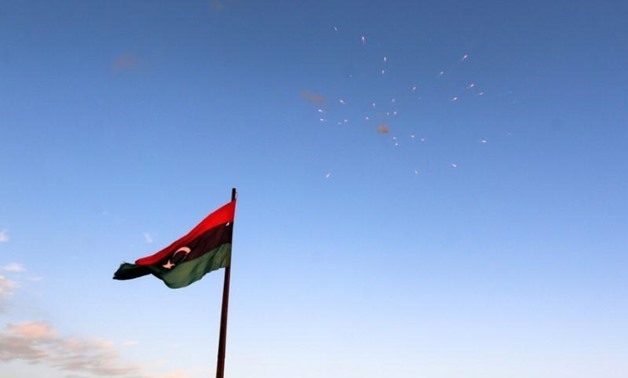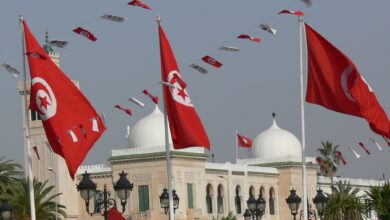The headlines of Monday’s state-owned and independent dailies are shared between two leading stories: the collapse of the Tunisian government and its immediate repercussions, and the verdict of one of the three men behind last year’s church shooting in the Upper Egyptian town of Naga Hammadi.
State-owned Al-Ahram’s report on Tunisia comes with details of a “mountain pursuit,” with the Tunisian army “hunting down” members of ousted ruler Ben Ali’s presidential guard as they attempt to flee into Libya. “The din of gunshots was uninterrupted” throughout the night, and several wounded people were reportedly rushed to a nearby hospital. An identical report in state-owned Al-Akhbar also asserts that former Minister of Interior Rafiq Belhag has recently been apprehended, as well as a “relative of former president Ben Ali, and several key regime figures.” According to Al-Ahram, the army received assistance in its efforts from residents of surrounding towns.
A wider scope of the situation is provided by independent daily Al-Dostour’s headline, which describes the “unprecedented chaos in Tunisia, as corpses line streets and fears of an Islamist regime abound.” After setting the scene, the paper goes on to summarize Sunday’s meeting between interim Prime Minister Mohamed Ghannouchi and “a number of prominent figures,” which revolved around the possibility of forming a National Unity coalition government, and the organization of internationally supervised elections. The paper also reports that armed forces have succeeded in quelling the widespread looting and violence of the past few days.
Al-Shorouk’s coverage focuses on the “Tunisian calls for another revolution to tear out the vestiges of Ben Ali’s regime.” The independent Al-Shorouk claims Tunisian leaders are opposing the idea of an immediate election, as the candidates would likely be “members and supporters of the collapsed regime.” Speaking exclusively to Al-Shorouk from London, exiled progressive Islamist Rashid al-Ghannushi explained, “the dictator may be gone but the residues of dictatorship remain, and it is impossible for an institution of corruption and tyranny to produce a true democratic leader.” Al-Ghannushi’s opinion was echoed throughout Al-Shorouk by several prominent Tunisian activists and politicians.
Independent daily Al-Wafd also leads with a report on the repercussions of the Tunisian uprising, coming under the headline, “Arab leaders worried by Ben Ali’s unexpected fall.” The paper reprints The Washington Post’s description of the uprising as an “alarm bell for the region’s dictators,” as well as its claim that the incident served as a wakeup call for President Obama, who had previously underestimated the necessity for reform in the Middle East.
In local news, Mohamed Ahmed Hussein, also known as Hammam al-Kamouny, has been sentenced with execution for his part in last year’s Naga Hammadi church shootings. In a session that Al-Ahram said only lasted four minutes, al-Kamouny’s verdict was announced and his “papers transferred” to Grand Mufti, Sheikh Ali Gomaa, who will review them before approving the sentence in a session scheduled for 20 February. The same session will see the announcement of the verdicts for Kirshy Aboul Haggag and Hendawy Sayed Mohamed, the two men who, with al-Kamouny, opened fire on worshippers leaving church during last year’s Coptic Christmas celebrations, leaving six Christians and one Muslim police officer dead, and nine wounded. State-owned and independent dailies are unanimous in reacting to the verdict, describing it as “fair”, “a relief to victims’ families,” and by Naga Hammadi church Bishop Kirollos as “a lesson to those who pose a threat to society…and one that will undoubtedly please all Egyptians, Copts and Muslims.”
Meanwhile, Minister of Education Ahmed Zaki Badr has an exceptionally bad day, as a crowd of “hundreds of ministry employees” call for his immediate “exile.” Employees of the ministry’s “book sector, technological advancement center, and (weirdly enough) secret printing house” were angered at the new “decisions and policies” which would have them transferred from their current posts to, in most cases, remote locations. They barricaded the ministry, chanting “you’ve wrecked it, now get out,” and “we’ve had enough of you and your father,”–a reference to Badr’s father, a high-ranking government official with a less than pristine reputation. Al-Shorouk’s report claims that after storming the building, the crowd presented a letter annulling Badr’s transfers to Mahmoud Mohamed Shahat, general director of the ministry’s human resources department. Shahat allegedly signed the agreement, only to have it promptly torn to shreds by the protestors, as they chanted “liars, liars.”
Al-Akhbar’s frontpage also features a report on Egyptian "supercop" Mohamed Abdel Rahim, who arrested a trio of artifact smugglers after they offered him a bribe of LE82 million in return for his assistance in excavating an obelisk which they had uncovered in al-Sharqiya. Abdel Rahim, who was approached by a police officer involved in the scheme, played along with the smugglers, secretly recording their conversations before making his arrest. The obelisk is estimated to be worth US$150 million.
Egypt's papers:
Al-Ahram: Daily, state-run, largest distribution in Egypt
Al-Akhbar: Daily, state-run, second to Al-Ahram in institutional size
Al-Gomhorriya: Daily, state-run
Rose al-Youssef: Daily, state-run, close to the National Democratic Party's Policies Secretariat
Al-Dostour: Daily, privately owned
Al-Shorouk: Daily, privately owned
Al-Wafd: Daily, published by the liberal Wafd Party
Al-Arabi: Weekly, published by the Arab Nasserist party
Youm7: Weekly, privately owned
Sawt al-Umma: Weekly, privately owned



